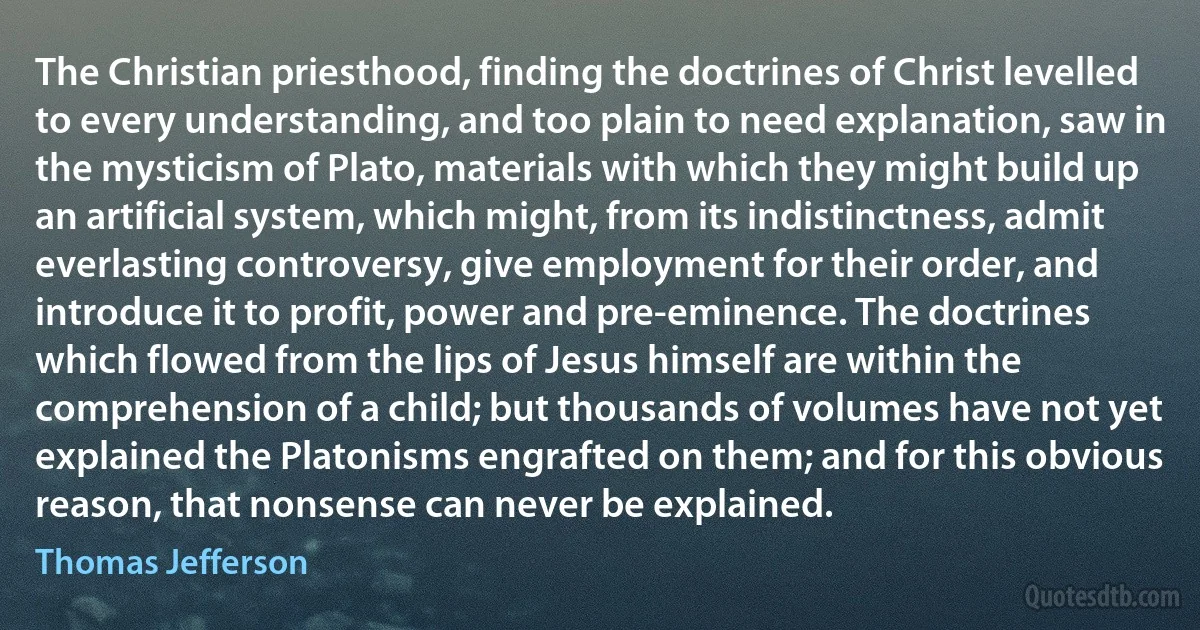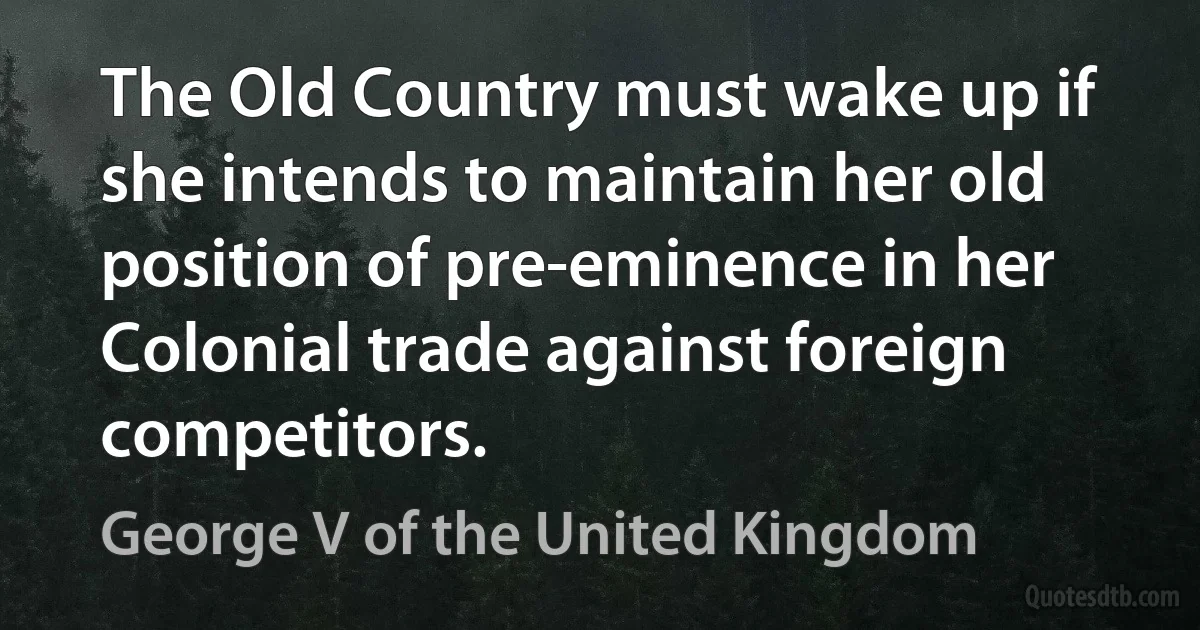Pre-eminence Quotes
A zeal for different opinions concerning religion, concerning government, and many other points, as well of speculation as of practice; an attachment to different leaders ambitiously contending for pre-eminence and power; or to persons of other descriptions whose fortunes have been interesting to the human passions, have, in turn, divided mankind into parties, inflamed them with mutual animosity, and rendered them much more disposed to vex and oppress each other than to co-operate for their common good.

James Madison
I feel, Sir, at this instant, how much I had been animated in my childhood by a recital of England's victories:-I was taught, Sir, by one whose memory I shall ever revere, that at the close of a war, far different indeed from this, she had dictated the terms of peace to submissive nations. This, in which I place something more than a common interest, was the memorable aera of England's glory. But that aera is past...the visions of her power and pre-eminence are passed away...Let us examine what is left, with a manly and determined courage...Let us feel our calamities-let us bear them too, like men.

William Pitt the Younger
For it would now seem that the policy and vanity of the Court equally concurred in endeavouring to keep out of sight whatever can manifest our pre-eminence, which they undoubtedly feel, but have not yet learned to make the proper use of. It is, however, in vain to attempt arresting the progress of human knowledge. I am, indeed, very much mistaken if all the authority and address of the Tartar Government will be able much longer to stifle the energies of their Chinese subjects. Scarcely a year now passes without an insurrection in some of their provinces. it is true they are soon suppressed, but their frequency is a strong symptom of the fever within. The paroxysm is repelled, but the disease is not cured.

George Macartney
For approximately 500 years [science's] argument for its pre-eminence was that it could create beautiful toys: aircraft, railroads, global economies, television, spacecraft. But that is a fool's argument for truth! I mean, that's after all how a medicine show operates, you know: the juggler is so good, the medicine must be even better! This is not an entirely rational way to proceed.

Terence McKenna
Our books have informed us that the pre-eminence in chivalry and learning once belonged to Greece. Then chivalry passed to Rome, together with that highest learning which now has come to France. God grant that it may be cherished here, and that it may be made so welcome here that the honour which has taken refuge with us may never depart from France: God had awarded it as another's share, but of Greeks and Romans no more is heard, their fame is passed, and their glowing ash is dead.

Chrétien de Troyes
Whatever people do in the market economy, is the execution of their own plans. In this sense every human action means planning. What those calling themselves planners advocate is not the substitution of planned action for letting things go. It is the substitution of the planner's own plan for the plans of his fellow-men. The planner is a potential dictator who wants to deprive all other people of the power to plan and act according to their own plans. He aims at one thing only: the exclusive absolute pre-eminence of his own plan.

Ludwig von Mises
The moral nature of man is more sacred in my eyes than his intellectual nature. I know they cannot be divorced - that without intelligence we should be Brutes - but it is the tendency of our gaping, wondering dispositions to give pre-eminence to those faculties which most astonish us. Strength of character seldom, if ever, astonishes; goodness, lovingness, and quiet self-sacrifice, are worth all the talents in the world.

George Henry Lewes
If we judge from Islamic history, there is much to encourage us. For century after century, the Arabs, the Persians, the Turks and many other Islamic societies achieved powerful leadership roles in the world - not only politically and economically but also intellectually... The fundamental reason for the pre-eminence of Islamic civilizations lay neither in accidents of history nor in acts of war, but rather in their ability to discover new knowledge, to make it their own, and to build constructively upon it. They became the Knowledge Societies of their time.

Aga Khan IV
Whether the associations of the Imperial name are bad, as Mr. Gladstone thinks, I will not discuss. Splendid and imposing they certainly were, not only in the age of the Antonines, but in the best days of the mediaeval Empire, from Otto the Great to Frederick II. But that splendour they have lost. ... In fact, the title of King is now the less common of the two, and, with such associations as our kingship has, it is far more dignified. There has been a King of the English ever since the ninth or tenth century; no other Monarchy in Europe (except the lands of our Scandinavian kingsfolk and except the Crown of St. Stephen) can boast of anything like an equal antiquity. ... Why endanger the pre-eminence of style of the only European Crown which combines the glories of ancient legitimacy with those of equally ancient constitutional freedom?

James Bryce, 1st Viscount Bryce
I came to see that within the struggle for a juster world, there is a further struggle between the individual who cares for long-term values and those who are willing to use any and every means to gain immediate political ends - even good ends. Within even a good social cause, there is a duty to fight for the pre-eminence of individual conscience. The public is necessary, but the private must not be abolished by it; and the individual must not be swallowed up by the concept of the social man.

Stephen Spender
A zeal for different opinions concerning religion, concerning government, and many other points, as well of speculation as of practice; an attachment to different leaders ambitiously contending for pre-eminence and power; or to persons of other descriptions whose fortunes have been interesting to the human passions, have, in turn, divided mankind into parties, inflamed them with mutual animosity, and rendered them much more disposed to vex and oppress each other than to co-operate for their common good. So strong is this propensity of mankind to fall into mutual animosities, that where no substantial occasion presents itself, the most frivolous and fanciful distinctions have been sufficient to kindle their unfriendly passions and excite their most violent conflicts. But the most common and durable source of factions has been the various and unequal distribution of property. Those who hold, and those who are without property, have ever formed distinct interests in society.

James Madison
If we consider the relative positions of France and of England from 1680 to 1688, and compare them with the situation when Anne died, the contrast is great indeed. England, lately despised abroad and distraught at home, had become the chief instrument in winning the world war, and had then dictated the Peace. With sea-power no longer rivalled either by France or Holland, with financial and commercial pre-eminence hardly less remarkable, and endowed for the moment with the martial greatness lent her by Marlborough, Great Britain was relatively more important in the world in 1713 than in 1815 or 1919. No country save France was then a rival to her greatness.

G. M. Trevelyan
What a theme, and what a speech, and what a speaker, and how Oliver Cromwell himself would have been thrilled to hear the parliamentary cause elevated to its rightful pre-eminence... Writing as an impenitent Leveller who still begs to differ with you (and Oliver Cromwell) in so many matters, I still cannot withhold my wonder and excitement at what I heard there today.

Enoch Powell
Third, we must make increased use of our food as an instrument of peace--making it available by sale or trade or loan or donation-to hungry people in all nations which tell us of their needs and accept proper conditions of distribution. Fourth, we must assure our pre-eminence in the peaceful exploration of outer space, focusing on an expedition to the moon in this decade--in cooperation with other powers if possible, alone if necessary. Fifth, we must expand world trade. Having recognized in the Act of 1962 that we must buy as well as sell, we now expect our trading partners to recognize that we must sell as well as buy. We are willing to give them competitive access to our market, asking only that they do the same for us.

Lyndon B. Johnson


![But as I had forsaken the priests, so I left the separate preachers also, and those esteemed the most experienced people; for I saw there was none among them all that could speak to my condition. And when all my hopes in them and in all men were gone, so that I had nothing outwardly to help me, nor could tell what to do, then, oh, then, I heard a voice which said, "There is one, even Christ Jesus, that can speak to thy condition"; and when I heard it my heart did leap for joy. Then the Lord let me see why there was none upon the earth that could speak to my condition, namely, that I might give Him all the glory; for all are concluded under sin, and shut up in unbelief as I had been, that Jesus Christ might have the pre-eminence who enlightens, and gives grace, and faith, and power. Thus when God doth work, who shall let [hinder] it? and this I knew experimentally [through experience]. (George Fox)](https://cdn.quotesdtb.com/img/quotes_images_webp/17/george-fox-christ-condition-1006217.webp)
